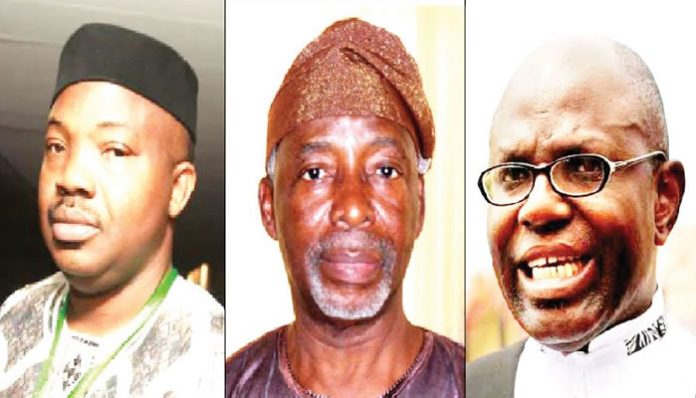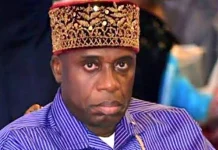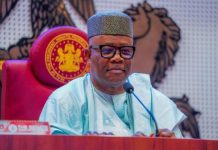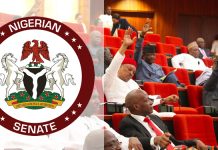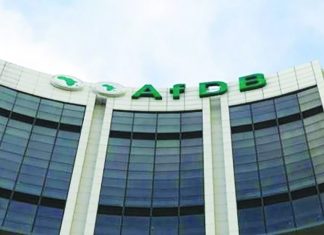

President Bola Tinubu, in his Democracy Day address on June 12, 2024, mentioned individuals who played significant roles in the struggle for Nigeria’s democracy. The list of those who paved the way for the current democracy is inexhaustible as many Nigerians were shot dead while confronting military dictators. GBENGA OLONINIRAN writes on the activists who were at the vanguard of the struggles against the military
On June 12, 2024, Nigeria’s Democracy Day, President Bola Tinubu, in his broadcast to the country, listed some individuals who played active roles in the struggle for the survival of Nigeria’s democracy.
The list of the individuals, whom the President said were among those who fought for democracy, has raised dust in some quarters as it appears to have excluded some other notable persons.
Tinubu had, during the broadcast, emphasised the significance of Democracy Day to the memory of MKO Abiola, the adjudged winner of the June 12, 1993, presidential election that was annulled by the military junta and regretted that Nigeria lost great heroes and heroines in the struggle for democracy.
“On this day, 31 years ago, we entered our rites of passage to become a true and enduring democratic society.
“Going through this passage was hard and dangerous. During the fateful six years that followed, we fought and struggled for our natural rights as human beings put on this earth by the divine hand of our Creator,” he said.
“We lost great heroes and heroines along the way. In this struggle, the winner of the June 12, 1993 presidential election, Chief MKO Abiola, the most significant symbol of our democratic struggle; his wife, Kudirat, General Shehu Musa Yar’Adua and Pa Alfred Rewane, among others, sacrificed their very lives,” Tinubu added.
The president thereafter proceeded to list some heroes of democracy, both living and deceased.
Among them were the late politician and lawyer, Chief Bola Ige and human rights activist and lawyer, Chief Gani Fawehinmi.
The Nobel Laureate, Prof. Wole Soyinka, also made the list, as well as former External Affairs Minister, Prof. Bolaji Akinyemi.
“Let us honour the memories of Chief Anthony Enahoro, Chief Abraham Adesanya, Commodore Dan Suleiman, Chief Arthur Nwankwo, Chief Chukwuemeka Ezeife, Admiral Ndubuisi Kanu, Chief Frank Kokori, Chief Bola Ige, Chief Adekunle Ajasin, Chief Ganiyu Dawodu, Chief Ayo Fasanmi, Chief Gani Fawehinmi, Chief Olabiyi Durojaiye, Dr Beko Ransome-Kuti, Chima Ubani, and others who have transited to the higher realm,” the president said.
He said the sacrifices of Gen Alani Akinrinade, Prof. Bolaji Akinyemi, Prof. Wole Soyinka, Chief Ralph Obioha, and Chief Cornelius Adebayo, among many others, should never be forgotten. “For, at least six years, they bore the pains and difficulties of life in exile.
“While the exiled pro-democracy activists kept the fire burning, their comrades at home sustained the pressure on the military brass hats. Among the latter are Olisa Agbakoba, Femi Falana, Abdul Oroh, Senator Shehu Sani, Governor Uba Sani, Chief Olu Falae, and other National Democratic Coalition leaders such as Chief Ayo Adebanjo and Chief Ayo Opadokun.”
The exclusion of some other notable individuals adjudged to have also played active roles in the struggle for Nigeria’s democracy was first protested by the family of the founder of the O’dua Peoples Congress, Dr Frederick Fasehun.
In a statement issued by his son, Remi, hours after Tinubu’s address on June 12, the family said excluding the OPC founder’s name from the list was uncharitable, ungrateful and unpardonable.
The younger Fasehun noted that Tinubu was a beneficiary of his father’s activism and sacrifice for democracy, adding that his father helped the President escape into exile.
He said, “The President was a beneficiary of our father’s activism and sacrifice for democracy. Not only were they in the trenches together, but Fasehun helped Tinubu to escape into exile. In fact, it is on record that when Gen Sani Abacha’s squad surrounded Senator Abraham Adesanya’s residence, where they held a meeting, Tinubu mounted the back of Fasehun and jumped the fence to flee into hiding and subsequently into exile.
“Several people who escaped from the country into exile and joined NADECO-Abroad, including Pa Anthony Enahoro, were personally taken by boat and bush paths, through the NADECO route, by Dr Fasehun. He was at a point the link between Pa Enahoro-NADECO and NUPENG, the union that played a pivotal role in that struggle.
“He was thrown into prison several times by the Gen Abacha junta, in Kirikiri, Ilorin and Kuje. At the infamous Inter Centre in Ikoyi Cemetery, he was held incommunicado for several months, an experience that inflicted immense damage on him physically and psychologically, to the extent of leaving his vision impaired for life.”
According to Remi, Fasehun’s wife and children still paid the price of their father’s sacrifice to birth the democracy Nigeria enjoys today.
“To ignore such an inimitable icon as Dr Frederick Fasehun from any so-called list of June 12 and Democratic Heroes smacks of crass injustice and inexplicable vendetta,” the statement from Fasehun’s family noted.
On Wednesday, former Kaduna lawmaker, Senator Shehu Sani, affirmed that the Governor of Kaduna State, Uba Sani, played a significant role in the 90s in the struggle for democracy.
The former senator, who made Tibubu’s list of democracy heroes alongside the Kaduna State governor, in a statement on X, said “Uba stood for us during our years in prison, in the 90s.
“Governor Uba maintained contact between us and our families and took the baton of the struggle to northern Nigeria. He kept in touch with the pro-democracy and progressive forces, until he was later nabbed by the Department of State Services, released and again arrested and beaten by the police.”
The former lawmaker also said the history of the June 12 struggle was incomplete without mentioning the role played by human rights activist and former presidential candidate of the African Action Congress, Omoyele Sowore, among others.
Sani also mentioned Prof Jibril Ibrahim, Segun Mayegun, Awwal Rafsanjani, the late lawyer and human rights activist, Bamidele Aturu, and Fasehun, among several others.
Others who missed Tinubu’s list included the Aare Ona Kakanfo of Yorubaland, Gani Adams, who played an active role in the pro-democracy struggle in the 90s. When contacted on Friday, his media aide, Kehinde Aderemi, said his principal was more concerned about the campaign for restructuring and regionalism in Nigeria.
“In those days, regionalism was part of the agreement made by our founding fathers before the military incursion. The military destroyed the template and set us up for a long and tortuous journey of political retrogression. And, up till today, the spirits of our leaders and founding fathers are not happy with the present situation in the country,” Adams was quoted as saying in a statement shared by his aide.
On his part, Sowore, in a chat with The According, said there was a difference between those who stood in the country to fight for democracy and those who were doing so from abroad.
“There is a dichotomy between those at home, who were hard-core activists and the diaspora activists,” he said.
Tinubu, in his speech, said while some exiled pro-democracy activists kept the fire burning, some comrades at home sustained the pressure on the military brass hats.
Sowore, however, said, “Till date, I never rated Tinubu, (Kayode) Fayemi and co, only Prof. Soyinka was considered as legit amongst them.”
He said it was later discovered that some persons who claimed to be against the military “were closer to the military than we thought.”
The late Odumakin also missed Tinubu’s list. The human rights activist was, until he died in 2021, the National Publicity Secretary of the Pan-Yoruba socio-cultural organisation, Afenifere.
Odumakin was a strong member of the National Democratic Coalition, which fought against the military regime of Abacha.
NADECO as a group called on Abacha to step down in favour of MKO Abiola, who won the 1993 presidential election.
A former governor of Ogun State, Chief Olusegun Osoba, also missed the list.
Excerpts from Osoba’s book, titled “Battle Lines: Adventures in Journalism and Politics,” published in 2021 on NADECO USA website ( revealed how the journalist and other eminent citizens under the coalition mobilised to defend the sanctity of Abiola’s mandate against the interest of the military.
In the book, Osoba gave an account of the ordeals that led to the movement against the cancellation of the election adjudged as the freest and fairest in Nigeria.
He recalled, “As we mobilised against the regime, there were several formal and informal groups formed by people working for the actualisation of the June 12 mandate. I was in a small group with Dr Chukwuemeka Ezeife, Chief John Oyegun and Dr Doyin Okupe.
“But the (General Sani) Abacha security goons were monitoring the activities of the pro-democracy and civil rights groups all over the country, particularly in the South-West.
“The turning point for Abiola was the inauguration of President Nelson Mandela in South Africa on May 10, 1994, which Abiola attended. He had reportedly received an equivalent of a hero’s welcome at the ceremony to the chagrin and embarrassment of the official Nigerian delegation led by General Abacha himself.
“The major organisation that emerged in this period which helped to shape the anti-military and pro-democracy movement was NADECO. NADECO was roughly a product of another organisation that existed before the June 12 crisis.”
The excerpts also revealed that the founding 49 signatories to NADECO were Chief Michael Adekunle Ajasin, Mallam Lawal Dambazzau, Commodore Ebitu Ukiwe, Chief Anthony Enahoro, Major General Adeyinka Adebayo (retd), Chief Bola Ige, Commodore Dan Suleiman, Dr Chukwuemeka Ezeife, ProfAnya O. Anya, Col. Yohanna Madaki, Rev Fr Moses Adasu, Dr Beko Ransome-Kuti, Rev. Tunji Adebiyi, Chief Ade Ojo, Chief Ralph Obioha, Chief Empire Kanu, Chief Michael Anyiam, Dr Sola Soile, Vice Admiral Akin Aduwo, Chief E. Duru, Mr. Nick Dazzang, Mr Labaran Maku, Dr A. A. Akingba, Mr Babas Eko and Oyekanmi.
Others were Mr Alex Ayatolla, Mrs Sarah Jubril, Alhaji Ganiyu Dawodu, Mr O. P. Edodo, Mr A. Barber, Otunba Olabiyi Durojaiye, Chief Olusegun Osoba, Chief John Odigie-Oyegun, Prof. Bolaji Akinyemi, Alhaji Mohammed Siraj Hamza, Dr Wahab Dosunmu, Otunba Aboyade Cole, Maj. Gen. Olufemi Olutoye (retd), Chief Sobo Sowemimo, Dr. Steve Achema, Chief Olaniwun Ajayi, Chief Olu Falae, Brig. Gen. Jonah Jang, Chief Abraham Adesanya, Chief Ayo Adebanjo, Mr Alao Aka-Bashorun, Mr Emmanuel Njiwah, Chief Vincent Nwizugbo and Dr Uma Eleazu.
While President Tinubu mentioned some of those listed above, others missed his list. Many Nigerians were shot dead during anti-military protests in those dark days.
Join Television Nigerian Whatsapp Now
Join Television Nigerian Facebook Now
Join Television Nigerian Twitter Now
Join Television Nigerian YouTUbe Now

